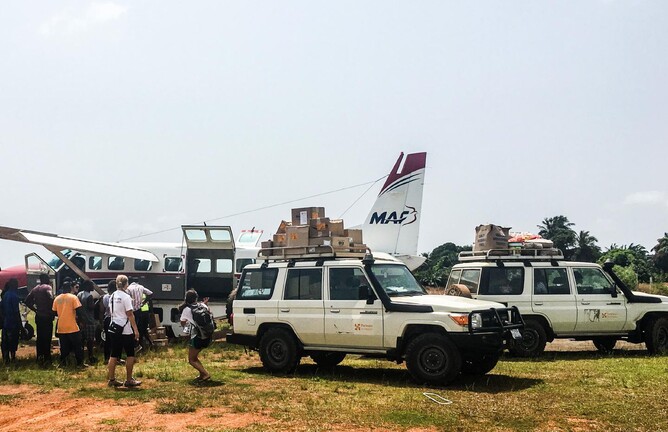After years of civil war and Ebola that decimated the health care system in Liberia, Partners In Health is committed to changing the odds for the Liberian people.
Changing the Odds
The odds have never been in a Liberian’s favor. Prior to 2014 the country had fewer than 200 doctors for the entire population of 4.3 million, due in part to back-to-back civil wars. In the US and most European countries, 10,000 or more doctors serve the same number. If you were a pregnant woman in Liberia, you had a 1 in 28 lifetime risk of maternal death. Compare this to 1 in 8,400 for European Union countries.
It’s difficult to imagine it could get much worse, but it did. In 2014, the Ebola epidemic struck, shattering the already weak health care system. At the invitation of the Ministry of Health (MOH) in late 2014, Partners In Health (PIH), an American NGO, came to Liberia to respond to the Ebola crisis in southeastern Maryland County, a 16-plus hour drive from the capital of Monrovia on brutal dirt roads.
After Ebola came under control, PIH stayed to focus on a long-term plan for rebuilding the broken health care system. It could take decades, but PIH is committed to changing the odds for Liberians.
Minnie Horace is a Liberian working with PIH as Clinical Lead Nurse. She received her nurse training in Canada and gained experience working at a hospital in Texas before returning to Liberia in 2014 to work with PIH during the Ebola crisis. Now Minnie mentors Liberian nurses working in PIH-supported facilities, an important part of strengthening their skills now and for the long term.
“I love mentoring the nurses. In my perception from back in the day, it was completely different from our new nurses now. I think after the war the basic knowledge, the foundation, was really lacking. I see the gap is great. It’s challenging but I like it. It gives me the greatest joy.”
A Partnership with MAF
Getting to and from the capital of Monrovia and Harper by road is nothing short of torture, particularly in the rainy season. PIH requires constant travel between the two cities for staff movement, emergency and cold chain medicine deliveries, transferring patients, bringing in technicians to service equipment and a host of other needs. Most of this transport is done by MAF and the gratitude from PIH is overwhelming, due in small part to the personal experiences of those who have taken the dreaded road trip.
Minnie pulls out her phone with pictures, a common response when the subject of ‘the road’ comes up. It’s a sea of mud like a storm of frozen waves, at times peaking higher than the cars. “Sometimes if MAF is too full, I take the road. We got stuck for two hours last time. That’s a good day. Sometimes you get stuck for days.” Once on a trip from Zwedru to Harper with a car full of 13 nurses for HIV training, the six-hour drive lasted 17 hours.
At the beginning of the year Jason boarded a car instead of a plane when the MAF aircraft was down for maintenance. “It took 16.5 hours. Everyone vomited multiple times. I was taking chemo-therapy-doses of anti-nausea meds, and giving it to every passenger. That’s how terrible the roads are, and this was the dry season.” In the rainy season, the road often becomes impassable.
Ask any of the staff with PIH or the hospital how MAF helps and you will hear stories.
For Dr. Sara Beste, who deals with malnutrition in children, it’s getting supplies of Plumpy’Nut via MAF.
For Katie Letheren, PIH Clinical Operations Officer, it’s flying in X-ray technicians or preventing drug ‘stock-outs’ (running out of a drug) by transporting program meds for HIV, tuberculosis, malaria, leprosy, and reproductive health on a weekly basis.
For Dr. Methodius George, Liberia’s Medical Director of J.J. Dossen Hospital, it’s being able to transfer seriously ill patients to a referral hospital by plane rather than by car for a full day on extremely rough roads, plus MAF’s response to emergency requests such as the sutures for the triplet birth—all to save patients’ lives.
Ian Mountjoy, PIH Director of Operations for Liberia, summarizes it best. “Our partnership with MAF has really made it possible for us to be able to work as extensively as we do here in the southeast given how remote it is and how unreliable it is getting vehicles back and forth. If we didn’t have MAF, we’d really struggle to do work this far out.”
Building Trust
“It’s amazing to be involved in the rebuilding process and already see change in the short time that I’ve been here, working hand-in-hand with the Ministry of Health in Maryland County which is very open and supportive,” Jason says. “This was the hospital for the dying. Now the community is starting to trust again.”
In the end, it’s all about giving Liberians more than just a chance at surviving an illness, accident, pregnancy, or birth. Partners In Health, working with the Ministry of Health and supported by MAF, are changing the odds.
